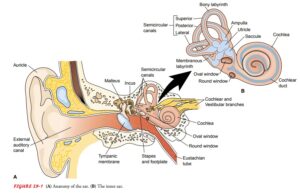Whether you are a world-class singer, enjoy singing along to the radio, or only give concerts in the shower, singing can help you feel better.
Belting out one of your favourite tunes can take your mind off your troubles and boost your mood. That’s because singing releases endorphins – a chemical produced and stored in the pituitary gland. Endorphins not only relieve pain, but also produce a sense of well-being and even euphoria. This release of our “feel-good” chemical is the same reaction you get after vigorous exercise, yoga and meditation, laughing, or eating dark chocolate!
Your Ear is Designed to Enjoy Singing
There is a bed of sensory cells inside your inner ear called the saccule. The primary function of this tiny organ is to give information to the brain about movement and head orientation. However, it also responds to the frequencies and volume of sound created while singing, resulting in an immediate feeling of pleasure …. no matter the quality of the sound!
Additional Benefits of Singing
Not only is singing a natural anti-depressant, it can also help reduce stress, improve mental alertness and memory, and help you sleep better.
Music in any form can be relaxing, but singing in particular can help release the stored tension in your muscles. It has also been shown to reduce stress hormones such as cortisol, cortisone and progesterone.
Singing can be a real workout for your lungs, and can even strengthen your diaphragm. The increased amount of oxygen needed to carry a tune also allows more oxygen to reach the brain, improving alertness, concentration and memory. Reading and remembering music can also act as memory training to keep your mind sharp. Learning keeps our brains active and is also known to help fend off depression. Not only that, research at the University of Frankfurt has shown that after singing, we have increased levels of antibodies in our blood, boosting our immune system.
How does singing help you sleep?
When we are more relaxed and less stressed, we are more likely to get a good night’s sleep. In addition to that, experts believe that singing can help strengthen the throat and palate muscles, which helps stop snoring and alleviate sleep apnea.
Give it a try!
 Singing is an ageless enjoyment – we start to sing when we begin to babble and never become too old to reap the benefits of song. Research even suggests that singing songs can provide emotional and behavioral benefits for people with Alzheimer’s disease and other types of dementia.
Singing is an ageless enjoyment – we start to sing when we begin to babble and never become too old to reap the benefits of song. Research even suggests that singing songs can provide emotional and behavioral benefits for people with Alzheimer’s disease and other types of dementia.
Whether or not you feel you are a competent singer is truly not important. The simple joy of singing can enrich your life in many ways. If, however, you are too shy to give it a try, you can boost your confidence in one of our many singing workshops, lessons or classes.

